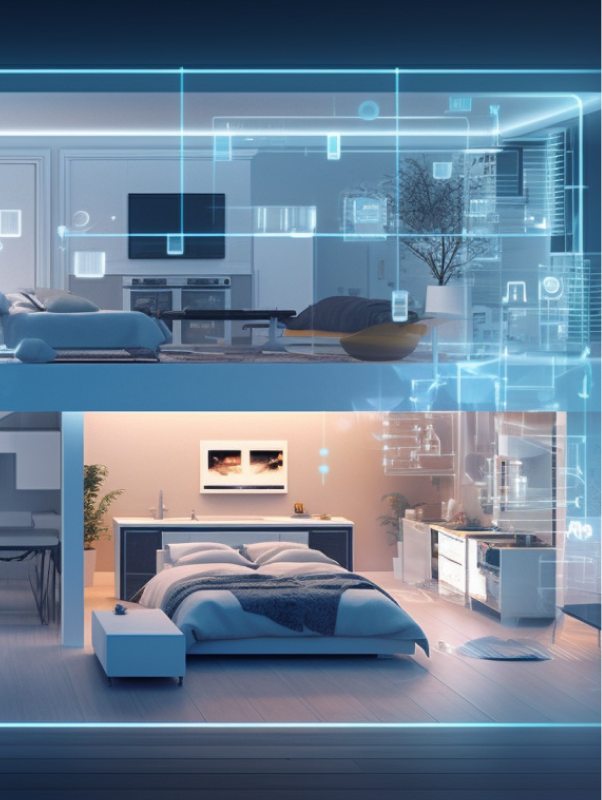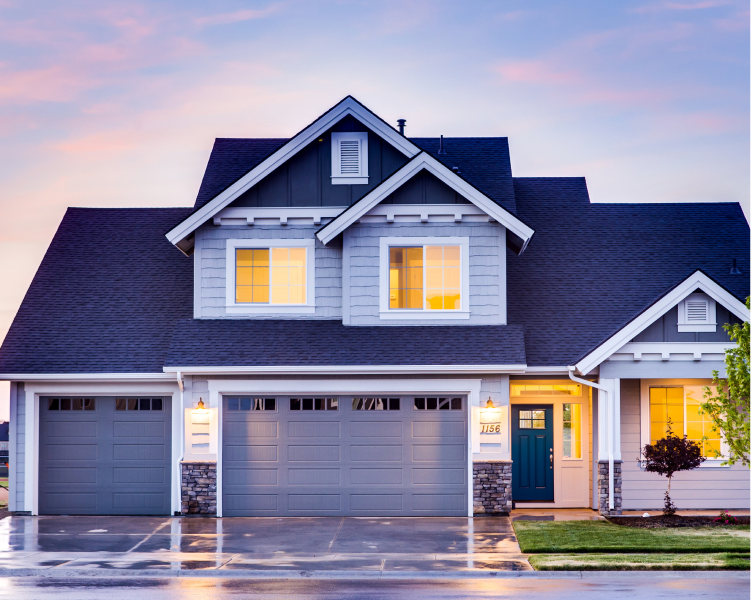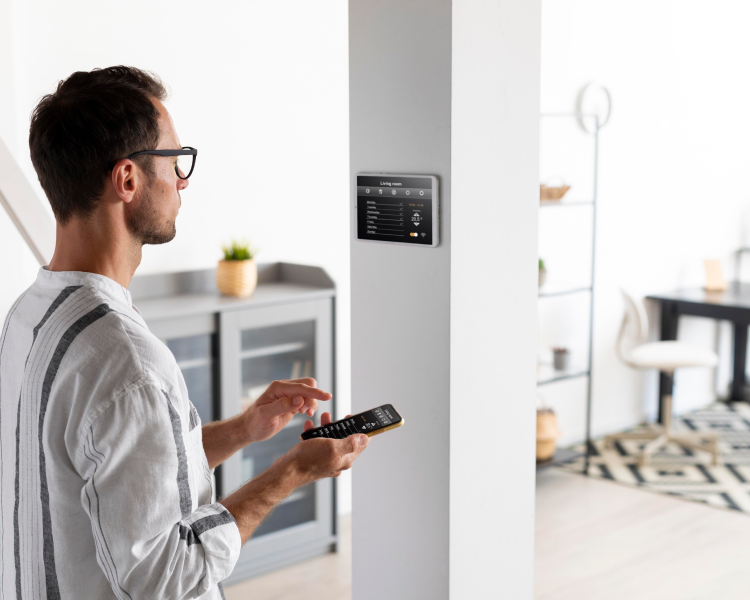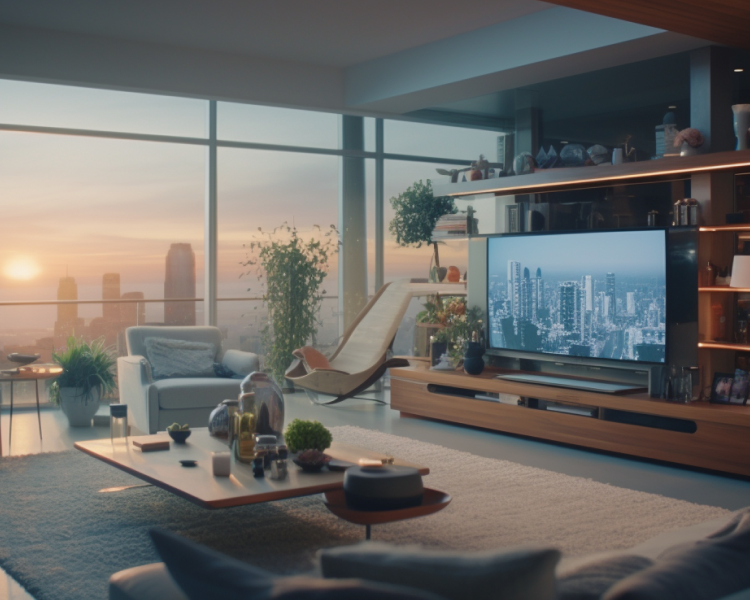Imagine relaxing on a sunny beach while sipping cold drinks, and suddenly, you remember something that sends a chill down your spine – you forgot to turn off the thermostat before leaving for your trip. Panic sets in as you envision the heating or cooling system running full blast, wasting precious energy and skyrocketing your utility bills. It's a situation that can quickly turn your dream vacation into a financial nightmare. But worry no more, as automated home systems quickly eliminate all such worries.
They ensure the security of your property, optimize energy consumption, and simplify daily tasks, revolutionizing the way you live. Automated home systems make life more convenient, efficient, and secure. Let's dive in to learn about the importance of automated home systems and the future of smart home technology!
- Benefits of Automated Home Systems
- Benefits of Smart Home Automation
- Is Home Automation Worth It? How Much Does Home Automation Cost?
- How to Automate Your Home with Automated Home Systems?
- Best Home Automation System - EVVR Center Lite
- Future of Smart Home Integration
Benefits of Automated Home Systems
Let's first discuss the components of a home automation system:
1. Smart Devices
Smart devices are the heart of any home automation system. They connect to your home network, come in various forms, and serve different purposes, from enhancing convenience to improving security and energy efficiency. Some common examples of smart devices for automated home systems include:
- Smart Lighting: Smart bulbs and switches allow you to adjust the lighting in your home using your smartphone or voice commands. You can set schedules, change colors, and even sync them with music or movies.
- Smart Locks: Smart locks provide keyless entry and remote access control. You can lock or unlock your doors from anywhere, grant temporary access to guests, and receive notifications about door activity.
- Smart Thermostats: Smart or Apple Homekit thermostats enable you to control your cooling and heating systems remotely, optimize energy usage, and create customized temperature schedules.
2. Smart Hub
A smart hub is the central control unit for your home automation system. It's the bridge between your smart devices and your connected applications, allowing them to communicate and work together seamlessly. Take an example of a Zigbee-compatible smart bulb that communicates with a Z-Wave-enabled smart lock through a smart hub. It allows you to create automation routines that trigger when specific events occur.
3. Connected Application
Connected applications, accessible via your smartphone or tablet, provide a user-friendly interface for managing and controlling your smart devices. You can create customized home settings, schedule tasks, and even give voice commands via voice assistants. Hence, you stay connected and in control of your smart home, whether at home or on the go.

Benefits of Smart Home Automation
The benefits of automated home systems are numerous, and that’s why the global home automation market is expected to hit a whopping USD 63.2 billion by 2025. A few advantages of such systems that you should know are:
Enhanced Convenience
Home automation systems significantly enhance convenience by offering control over various aspects of your living. Instead of manually adjusting lights, thermostats, and security settings, you can do so seamlessly through a single interface.
This streamlines your daily routines, making tasks like managing home entertainment, setting up lighting scenes, and even locking doors.
Enhanced Security and Peace of Mind
Home automation systems provide an elevated level of security and tranquility through smart locks, surveillance cameras, and motion sensors.
Smart locks offer the convenience of keyless entry and the ability to grant access remotely, enhancing control over who enters your home. Surveillance cameras deliver real-time monitoring and instant alerts in response to unusual activity, allowing you to stay vigilant even when you're away.
Improved Energy Efficiency
Home automation systems optimize energy consumption by offering precise control over devices. Smart thermostats, for instance, learn your temperature preferences and automatically adjust heating and cooling to save energy when you're away.
Contrarily, smart lighting systems turn off lights in empty rooms, reducing unnecessary electricity consumption. Furthermore, real-time energy monitoring allows you to identify energy-hungry devices and make informed decisions about usage.
Customization and Integration
Lastly, home automation systems are highly customizable to meet your specific needs and preferences. You can integrate various smart devices, from entertainment systems to smart appliances, and create automation routines that reflect your lifestyle. This adaptability allows you to tailor your home environment to suit your family's unique requirements, whether you desire a cozy movie night or a well-lit homecoming.

Is Home Automation Worth It? How Much Does Home Automation Cost?
Yes, automated home systems are worth it, offering convenience, energy savings, and security benefits that make life easier and more efficient. You get the ability to control your home's functions remotely, from adjusting the thermostat to checking security cameras, thus simplifying daily tasks. Plus, these systems also lead to significant energy bill reductions by optimizing energy use.
The cost of home automation varies widely depending on your needs and preferences. Basic home automation setups typically start at around $2,000 to $4,000. However, the cost may increase significantly if you opt for more extensive automation, including smart appliances and whole-home integration.
Tip: Remember, while there's an initial investment, the long-term savings on energy and added peace of mind often justify the expense.
How to Automate Your Home with Automated Home Systems?
Here are the steps you should follow to automate your home with automated home systems:
Step 1: Assess Your Needs
Begin by identifying your specific automation needs and priorities. Do you wish to enhance energy efficiency, improve security, or simply enjoy added convenience? Make a list of the areas you'd like to automate, such as lighting, climate control, security, or entertainment.
Step 2: Choose a Smart Hub
Select a central hub or controller for your automated home system. Smart hubs act as the brains of your setup, allowing devices to communicate and work together. Popular options include EVVR Center Lite, Samsung SmartThings, Amazon Echo, or Google Home. Ensure your chosen hub supports the devices you plan to integrate.
Step 3: Select Smart Devices
It's time to pick the smart devices that align with your needs and are compatible with your chosen hub. Some common options include smart thermostats, lighting systems, security cameras, smart locks, and voice assistants. Consider factors like brand compatibility, features, and your budget.
Step 4: Install and Set Up Devices
Get to the manufacturer's instructions to install and set up your chosen smart devices. This may involve connecting them to your home Wi-Fi network, downloading the respective apps, and configuring settings.
Step 5: Create Automation Routines
Utilize the hub's app or interface to create automation routines. For instance, you can create a "Good Night" routine that turns off lights, adjusts the thermostat, and locks the doors with a single command.
Best Home Automation System - EVVR Center Lite
The EVVR Center Lite is among the best-automated home systems, and its features include:
The EVVR Center Lite - is the epitome of automated home systems. Offering unrivaled compatibility, this home control hub seamlessly connects your smart devices through Zigbee 3.0, Z-Wave Plus, Wi-Fi, or Bluetooth.
What sets EVVR Center Lite apart is its future-proof design, ensuring seamless integration with Matter technology on the horizon. One of its standout features is local data storage, providing top-tier enterprise-class data encryption that processes and stores your information locally in real time.
Say goodbye to cloud storage concerns and privacy worries; EVVR Center Lite prioritizes your security. With a star network configuration and central control, you can easily extend your smart home's reach, making it suitable for commercial and expansive residential spaces. Plus, the EVVR Console, whether accessed through the web or mobile app, offers a user-friendly interface for creating drivers and configuring home automation.

Key Features
- High Compatibility: EVVR Center Lite offers exceptional compatibility, effortlessly connecting to your smart devices via Zigbee 3.0, Z-Wave Plus, Wi-Fi, or Bluetooth.
- Versatile Protocol Support: With support for multiple protocols, including Zigbee 3.0 and Z-Wave Plus Protocol, you can enjoy the freedom to choose the devices that best suit your needs and preferences.
- Central Control: Create a star network configuration with additional EVVR controllers, offering centralized control for large spaces or commercial settings with exclusive flexibility and stability.
- Intuitive Interface: Access the EVVR Console via web or mobile app, making it a breeze to configure automation, manage devices, and organize rooms and users. Its forward-thinking design ensures a seamless user experience, simplifying your smart home journey.

Future of Smart Home Integration
The future of smart home integration holds exciting possibilities. As technology evolves, we can anticipate even greater convenience and connectivity in our daily lives. Smart homes will become more intuitive, understanding our preferences and needs without us having to explicitly command them. Interoperability among devices and platforms will improve, offering seamless control and communication.
Artificial intelligence and machine learning will play larger roles, enabling predictive automation that optimizes energy usage, enhances security, and anticipates our comfort. Privacy and security will also remain paramount, with advancements in encryption and authentication.
Conclusion
Automated home systems offer exceptional benefits that can truly transform your home environment. They significantly improve energy efficiency, reducing utility bills and contributing to a greener planet. Several home automation systems are available, but EVVR stands out as a leader in the field of home automation systems.
With its high compatibility, support for multiple protocols, and future-proof design, EVVR offers a comprehensive solution that meets the diverse needs of homeowners. Besides, you can try our other smart home products, such as EVVR Energy Monitoring Smart Plug and Relay, EVVR Pad S, and more. So, get in touch and take your home automation to a new level.











